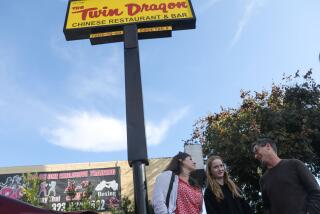A Place Where Arabs, Jews Worked Together Like ‘Brothers’
- Share via
HAIFA, Israel — For 38 years, the Maxim restaurant, perched above the Mediterranean coastline, has been a symbol here of what seems so elusive elsewhere in the Holy Land: that Arabs and Jews can live in peace.
The eatery was founded by a Jew and a Christian Arab, both of them citizens of Israel, and it gradually became a local institution frequented by a lively, mixed clientele.
But on Saturday, a young Palestinian woman strapped explosives to her body and detonated them inside the restaurant, killing 19 other people and ripping the place apart.
Tony Mattar, the son of the Arab co-owner and Maxim’s manager, said the dream will not be destroyed too.
“The restaurant was an example for the whole country of how it’s possible to have coexistence,” Mattar, 36, said. “The person who tried to blow us up won’t stop us.”
At the time of the blast, about 2:15 p.m., Maxim was alive with the warm, tolerant spirit that its fans say infused the place. Arab waiters glided between the tables, taking orders and bantering with players from a Jewish soccer team, Arab diners and young Jewish families enjoying a day of leisure before the Yom Kippur holiday.
“Arabs and Jews, we were like brothers,” said Salim Khoury, 40, who has been a waiter at Maxim for seven years and who was slightly injured in the explosion.
Members of both communities were among the dead, including several Jewish children.
When he heard about the attack, Muli Nir, the grandson of Maxim’s Jewish owners, rushed to the scene, worried about the safety of the workers and customers.
“They are all my family,” he told reporters. “We never thought something like this would ever happen to us.”
His mother cried as she surveyed the scene: the overturned tables, the shattered glass, the bloody remnants of lives turned upside-down or ended in a millisecond. Nir’s grandmother, who helped found the restaurant with her husband, recalled on Israeli radio their nearly four decades of happy dealings with an Arab family whose kids called her “mother.”
That their joint venture was born in Haifa in 1965 reflects the relaxed atmosphere of this seaside city, with its hills and spectacular views.
Decades before Israel was founded in 1948, Jews and Arabs were already living here in relative harmony, often in the same neighborhoods and sometimes in the same buildings -- a rarity in most parts of Israel. After the establishment of the Jewish state, many Arabs stayed on, becoming Israeli citizens.
There is a strong Arab middle class in Haifa, although those Arabs, like the rest of the country, have been hit hard by the slumping economy during the three years of the Palestinian uprising.
A city spokesman said two years ago that about 12% of Haifa’s 270,000 people were of Arab descent.
Despite -- or because of -- its diversity, the city has been a regular target of suicide attacks, most recently a bus bombing in March in which 15 people were killed. A year before that, an Arab-owned restaurant was targeted, killing 16.
“Every attempt on Haifa is not an attempt only on the inhabitants, but also an attempt to jeopardize the very special coexistence” that has developed in the city, Mayor Yona Yahav said Saturday as he surveyed the wreckage of Maxim.
Mattar, Maxim’s manager, was in the kitchen at the time of the explosion and escaped unhurt. His brother, who was also at the restaurant, had minor injuries on his face and was taken to a nearby hospital, where Mattar waited with other family members to make sure he was all right.
Mattar said he couldn’t yet think about whether to restore and reopen the restaurant. For the moment, he said, his thoughts were on how such attacks could be stopped.
“I want to prove that we have a lot of power to destroy terror,” he said. “We have to be strong and not give up.”
The same sentiment echoed in the corridor outside the hospital emergency room, where families of the injured waited to hear how their loved ones were doing. Many were Arabs.
“I wish all the terrorists would die, and those that send them too,” one Arab woman said as she hugged a friend. “What did they kill for? Who’s going to benefit from it?”
Another woman said, “Look and see: Our blood is mixed on the floor with Jewish blood.”
*
Special correspondent Tami Zer contributed to this report.
More to Read
Sign up for Essential California
The most important California stories and recommendations in your inbox every morning.
You may occasionally receive promotional content from the Los Angeles Times.














